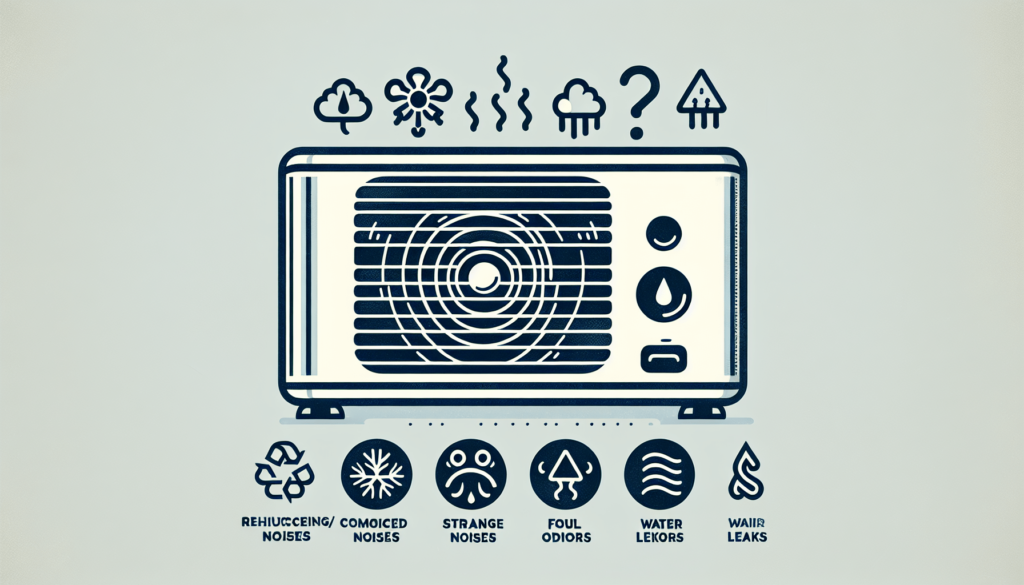Maintaining the functionality of your mini split AC system is essential to ensure optimal performance and a comfortable indoor environment. As the seasons change, it is crucial to be aware of the signs that indicate your system is in need of maintenance. By recognizing these signs early on, you can address any issues promptly and avoid costly repairs or replacements. In this article, we will explore the key indicators that your mini split AC system requires maintenance, allowing you to take the necessary steps to keep it running smoothly.
Unusual Noise During Operation
Significance of Silent Operation of Mini Split AC
When it comes to the operation of your mini split AC, the significance of silent performance cannot be overstated. A well-maintained mini split AC should operate quietly, without any unusual or excessive noise. Silent operation not only ensures a comfortable and peaceful indoor environment but also serves as an indicator of the system’s efficiency and functionality.
Common Unusual Noises and their Implications
If you notice any unusual noises coming from your mini split AC during operation, it is crucial to address them promptly to avoid potential damage and costly repairs. Some common unusual noises include rattling, buzzing, screeching, or banging sounds.
Rattling noises may indicate loose components or debris within the unit, while buzzing sounds can suggest electrical issues. Screeching or squealing noises are often a sign of worn-out belts or bearings, which require immediate attention. Banging sounds can indicate a more severe problem like a loose fan or compressor issue. It is important to recognize and address these noises early on to prevent further damage and ensure optimal performance.
When to Seek Professional Help
While some minor noise issues can be resolved through basic troubleshooting, it is recommended to seek professional help if you are unsure about the source or implications of the unusual noise. HVAC professionals have the expertise to diagnose and repair any potential issues with your mini split AC system.
It is especially important to seek professional help if the unusual noise is accompanied by a decrease in cooling efficiency, increased energy bills, or any other related issues. Professional maintenance and repair services can help you identify the root cause of the noise and ensure that your mini split AC system operates smoothly and silently.
Decreased Cooling Efficiency
Normal Cooling Performance of a Mini Split AC
A mini split AC system plays a critical role in maintaining a comfortable indoor environment by efficiently cooling your space. Under normal circumstances, a properly functioning mini split AC should provide consistent and effective cooling performance throughout its operational lifespan. It should maintain a desired temperature range, removing heat from the indoor environment and circulating cool air.
Signs of Decreased Cooling Efficiency
If you notice a decline in your mini split AC’s cooling performance, it is crucial to address the issue promptly to restore optimal cooling efficiency. Some common signs of decreased cooling efficiency include:
-
Insufficient cooling: If your mini split AC is struggling to cool your space or fails to reach the desired temperature, it may indicate an underlying issue that needs attention.
-
Uneven cooling: Uneven cooling occurs when certain areas or rooms in your space feel cooler than others. This could be a result of airflow blockages or issues with the distribution of cool air.
-
Long cooling cycles: If your mini split AC runs for prolonged periods without achieving the desired temperature, it may indicate a problem with the system’s efficiency or capacity.
Reasons Behind Poor Cooling Performance
Several factors can contribute to decreased cooling efficiency in a mini split AC system. Some common reasons include:
-
Dirty air filters: Dirty or clogged air filters restrict airflow and reduce the cooling efficiency of the system. Regular filter cleaning or replacement is essential to maintain optimum performance.
-
Refrigerant leaks: Low refrigerant levels can hinder the cooling process and lead to poor performance. Refrigerant leaks should be promptly addressed by a professional technician.
-
Condenser coil issues: Dirty or damaged condenser coils can impair the heat exchange process, resulting in decreased cooling efficiency. Regular coil cleaning and maintenance are vital to ensure optimal performance.
Addressing these issues through regular maintenance and timely repairs can help restore the cooling efficiency of your mini split AC system, ensuring a comfortable and cool indoor environment.
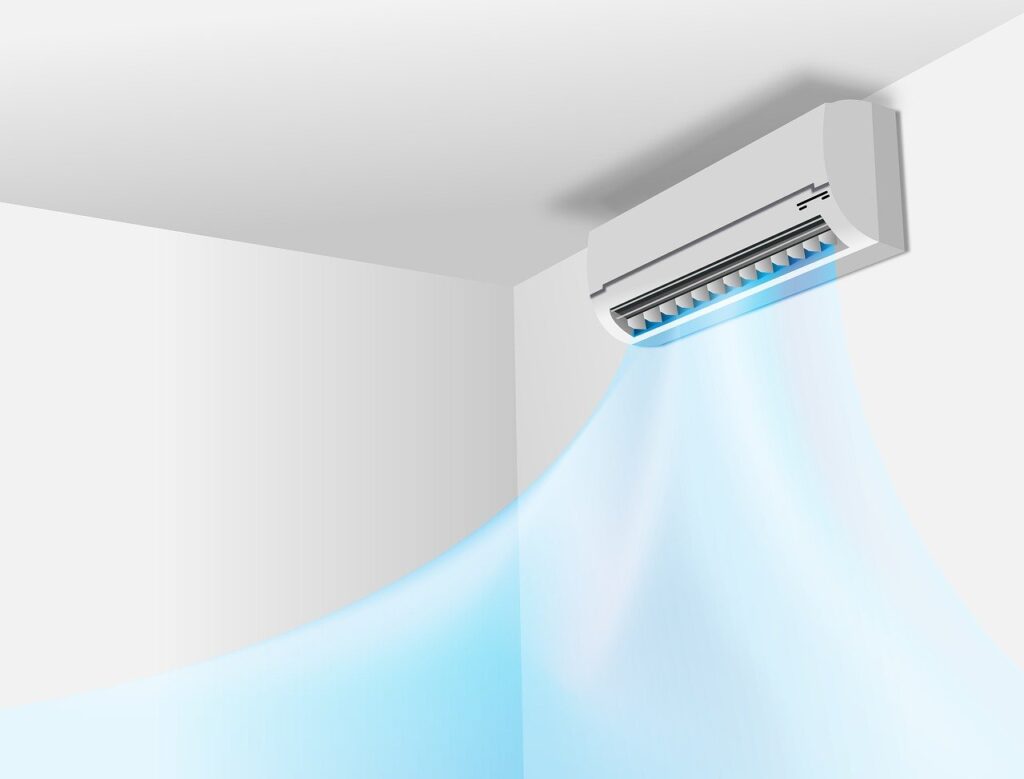
This image is property of pixabay.com.
Increased Energy Bills
Possible Connection Between AC Performance and Energy Consumption
The performance of your mini split AC system can directly impact your energy bills. A well-maintained and efficient system consumes less energy, resulting in lower energy bills. Conversely, a system that is not functioning optimally can lead to increased energy consumption and higher utility costs.
How Mini Split AC Can Influence Energy Bills
Several factors can contribute to increased energy consumption by your mini split AC system. These factors include:
-
Inadequate maintenance: Lack of regular maintenance can cause the system to accumulate dirt and debris, which hampers its efficiency. A dirty system requires more energy to cool the space, resulting in increased energy consumption.
-
Insufficient insulation: Poor insulation in your space can cause cooled air to escape, leading to increased energy consumption as the system works harder to maintain the desired temperature.
-
Improperly sized system: An oversized or undersized mini split AC system can lead to inefficiencies, as it may struggle to cool or heat the space effectively. Proper sizing is crucial to ensure optimal energy usage.
Energy Efficiency and Regular Maintenance
To ensure energy efficiency and reduce your energy bills, regular maintenance is key. This includes:
-
Cleaning or replacing air filters: Dirty air filters restrict airflow and increase energy consumption. Regularly cleaning or replacing filters can improve efficiency.
-
Cleaning coils and components: Dirt and debris on the condenser coils and components can impair heat exchange and the system’s efficiency. Regular cleaning by a professional technician is necessary to maintain optimal performance.
-
Checking and sealing ductwork: Leaky or poorly insulated ductwork can lead to energy loss. Regular inspection and proper sealing of ducts can improve overall energy efficiency.
Regular maintenance, combined with proper insulation and sizing, can go a long way in optimizing energy consumption and reducing your monthly bills.
Continuous Running of the System
Understanding the Normal Operating Cycle of Mini Split AC
It is important to understand the normal operating cycle of your mini split AC system to differentiate between normal operation and continuous running. A mini split AC operates by cycling on and off in response to the cooling demands of the space.
During the cooling cycle, the mini split AC absorbs heat from the indoor environment through the evaporator coils. The heat is then transferred to the outdoor unit, where it is dissipated into the atmosphere. Once the desired temperature is reached, the mini split AC cycles off until the next cooling cycle is required.
Common Causes of Continuous Running
While continuous running may be normal during extreme heat or high cooling demand, it can also indicate underlying issues with the system. Some common causes of continuous running include:
-
Undersized system: If your mini split AC system is undersized for the space it is intended to cool, it may continuously run in an attempt to meet the cooling demands. Proper sizing is crucial for optimal performance.
-
Leaky ducts: Leaky or poorly insulated ductwork can result in air loss, causing the system to run continuously to compensate for the lost cool air. Regular inspection and proper sealing of the ducts can resolve this issue.
-
Thermostat issues: A faulty thermostat can cause the mini split AC to run continuously, as it fails to accurately sense the indoor temperature and control the cooling cycle. Repairing or replacing the thermostat can resolve this issue.
Implications of a Continuously Running System
A continuously running mini split AC system can have several implications, including:
-
Reduced efficiency: Continuous operation leads to increased energy consumption, resulting in higher utility bills and reduced overall efficiency.
-
Increased wear and tear: Continuous running puts additional strain on the components of the mini split AC system, leading to increased wear and potentially shortening its lifespan.
-
Inadequate temperature control: A continuously running system may struggle to maintain the desired temperature, resulting in discomfort and an inconsistent indoor environment.
If your mini split AC system runs continuously, especially without meeting the cooling demands or during moderate temperature conditions, it is essential to consult a professional technician to identify and rectify any underlying issues.
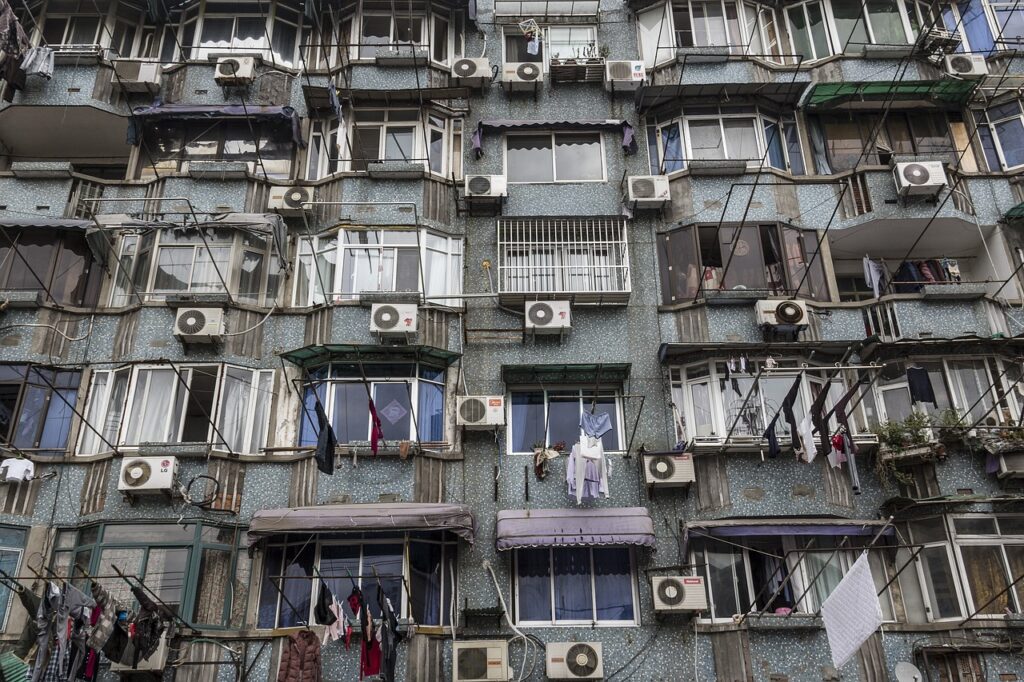
This image is property of pixabay.com.
Presence of Unpleasant Smell
Smell as an Indicator of Air Quality from Mini Split AC
The presence of an unpleasant smell emitting from your mini split AC system should not be ignored as it can indicate issues with the system’s air quality. A well-functioning mini split AC should provide clean, odor-free air to ensure a healthy indoor environment.
Possible Causes of Unpleasant Smells
Several potential causes can contribute to unpleasant smells from your mini split AC system, including:
-
Mold or mildew growth: Moisture accumulation within the system due to a clogged drain line or poor maintenance can lead to mold or mildew growth. These microorganisms emit a distinct musty odor.
-
Dirty air filters: Accumulated dirt, dust, and debris on the air filters can produce a foul smell when the system is running. Regular cleaning or replacement of air filters is essential to prevent this issue.
-
Bacterial or fungal growth: A lack of regular maintenance can result in bacterial or fungal growth on the cooling coils or other components of the system. These microorganisms can generate unpleasant odors.
Impact on Indoor Air Quality
The presence of unpleasant smells from your mini split AC system not only affects the comfort of your indoor environment but also has a direct impact on the indoor air quality. Inhaling air that contains foul odors can potentially lead to respiratory issues, allergies, or even severe health problems.
To address unpleasant smells and maintain optimal indoor air quality, regular maintenance and cleaning of the mini split AC system are necessary. Professional technicians can diagnose the root cause of the odor and provide appropriate solutions to eliminate the smell and ensure clean and fresh air circulation.
Leakage and Moisture Issues
Role of Moisture in the Cooling Process
Moisture plays a critical role in the cooling process of a mini split AC system. As the warm air is drawn into the system, the moisture in the air condenses on the evaporator coils. This condensation is captured and drained out of the system.
Signs of Abnormal Leakage or Moisture
While some condensation is normal during the cooling process, abnormal leakage or excessive moisture can indicate underlying issues with the mini split AC system. Signs of abnormal leakage or moisture include:
-
Puddles of water: If you notice puddles of water around the indoor unit or excessive water dripping, it may indicate a clogged drain line or a malfunctioning condensate pump.
-
Damp or wet areas: Moisture accumulation on walls, ceilings, or surrounding areas of the indoor unit can suggest a leak or drainage issue in the system.
-
Mold or mildew growth: Moisture problems can lead to the growth of mold or mildew, which can appear as dark spots or patches near the unit or on nearby surfaces.
Potential Risks of Ignoring Leakage and Moisture Issues
Ignoring leakage and moisture issues in your mini split AC system can have several potential risks, including:
-
Damage to the system: Excessive moisture or leaks can damage critical components of the mini split AC system, affecting its efficiency and potentially leading to costly repairs or replacement.
-
Mold and mildew health risks: Moisture problems can create an optimal environment for mold and mildew growth, which can negatively impact indoor air quality and pose health risks to occupants.
-
Structural damage: Prolonged moisture exposure can damage walls, ceilings, and surrounding structures, leading to costly repairs and potential safety hazards.
If you notice any signs of abnormal leakage or excessive moisture, it is crucial to address the issue promptly. Professional technicians can diagnose and rectify the underlying problem, ensuring the proper functioning and longevity of your mini split AC system.
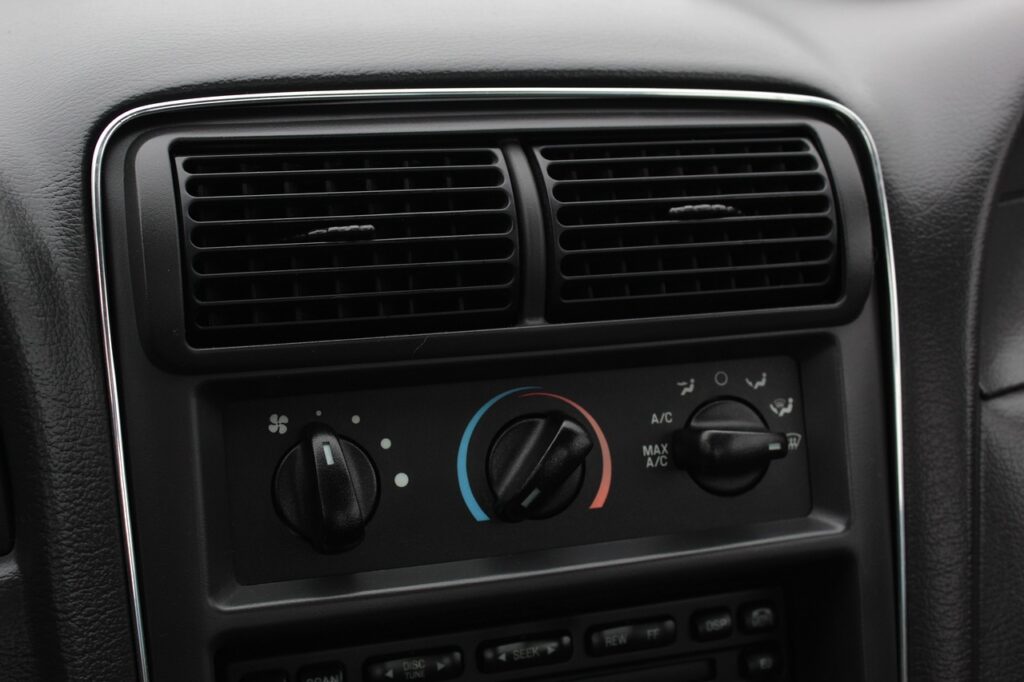
This image is property of pixabay.com.
Frozen Coils and Components
Standard Condition of Mini Split AC Coils
The evaporator coils in a mini split AC system play a vital role in the cooling process. Under normal circumstances, these coils should remain free of ice or frost. Frozen coils and components can indicate issues with the system’s functionality and should be addressed promptly to avoid further damage.
Causes of Frozen Coils and Components
Several factors can contribute to the freezing of coils and components in a mini split AC system, including:
-
Restricted airflow: Restricted or inadequate airflow over the evaporator coils can lead to temperature imbalances and cause condensation to freeze on the coils.
-
Low refrigerant levels: Insufficient refrigerant levels in the system can cause the evaporator coils to become too cold and freeze.
-
Dirty or blocked coils: Accumulated dirt, dust, or debris on the evaporator coils hampers the proper heat exchange process, leading to freezing.
Consequences of Frozen AC Components
Ignoring frozen coils and components in a mini split AC system can result in several consequences, including:
-
Decreased cooling efficiency: Frozen coils restrict proper heat exchange, reducing the system’s overall cooling efficiency and potentially causing uneven cooling throughout the space.
-
Increased energy consumption: The system has to work harder to compensate for restricted airflow, leading to increased energy consumption and higher utility bills.
-
Potential damage: Prolonged freezing of coils can cause damage to the system’s components, including the compressor, fan motor, or expansion valve, requiring costly repairs or replacement.
If you notice frozen coils or components in your mini split AC system, it is important to turn off the system immediately and consult a professional HVAC technician. They can diagnose and rectify the underlying issue to prevent further damage and restore optimal functionality.
Difficulty in Turning On the Unit
Proper Starting Mechanism of Mini Split AC
Turning on your mini split AC unit should be a straightforward process. However, if you experience difficulties in starting the unit, it could indicate an underlying issue that requires attention.
Possible Reasons for Startup Difficulties
There are several possible reasons for difficulties in turning on your mini split AC unit, including:
-
Power supply issues: Check if the unit is receiving power properly. Ensure that the power source is functioning and the unit is properly connected to the electrical supply.
-
Faulty wiring or connections: Loose or faulty wiring and connections can prevent the unit from starting. It is necessary to check the wiring connections and consult a professional if any issues are found.
-
Malfunctioning components: Startup difficulties can be caused by faulty components within the unit, such as relays, capacitors, or control boards. A professional technician can diagnose and repair these issues.
Repairing and Avoiding Future Startup Issues
Addressing startup difficulties in your mini split AC unit requires proper diagnosis and repair by a professional technician. They can identify the specific cause of the issue and provide the necessary repairs or replacements to ensure smooth and reliable startup.
To avoid future startup difficulties, regular maintenance is crucial. This includes professional inspections, cleaning of components, and proper lubrication of moving parts. Adequate maintenance and prompt repairs can help minimize the occurrence of startup problems, allowing your mini split AC unit to operate efficiently and reliably.
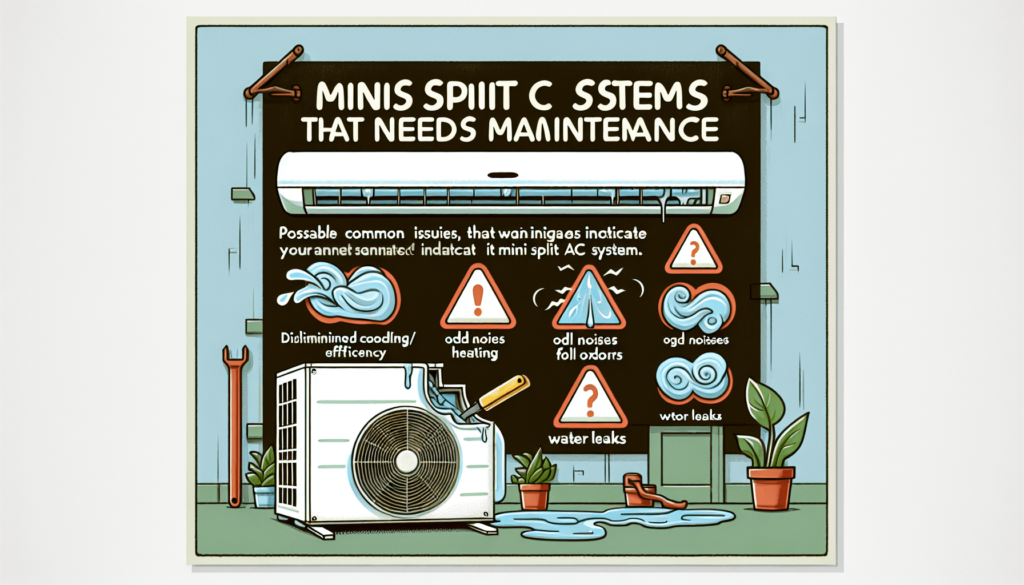
Frequent Requirement of System Reset
Understanding the System Reset in Mini Split AC
A system reset is a process in which the mini split AC is turned off and then turned back on to restore its functionality. While occasional system resets may be necessary, frequent requirements for system resets can indicate an underlying issue that needs attention.
Why Constant System Reset can Indicate a Serious Issue
If your mini split AC system frequently requires a system reset to function properly, it can indicate a serious issue. Some possible reasons for constant system resets include:
-
Electrical issues: Problems with the electrical connections, control boards, or sensors can cause the system to malfunction and require frequent resets.
-
Thermostat malfunction: A faulty thermostat can disrupt the communication between the system and the desired temperature settings, resulting in frequent resets being necessary.
-
Component failure: Constant system resets may indicate a failure in critical components, such as relays or capacitors, which require professional attention and repair.
Frequent system resets not only disrupt the comfort and operation of your mini split AC system but may also indicate potential safety hazards. It is essential to consult a professional HVAC technician to diagnose and address the underlying issue, ensuring the safe and reliable performance of your system.
How Maintenance can Prevent Unnecessary System Resets
Regular maintenance plays a crucial role in preventing unnecessary system resets in your mini split AC system. Professional maintenance services can:
-
Identify and resolve electrical issues: Regular inspections by professional technicians can identify any electrical issues early on, allowing for timely repairs and minimizing the need for system resets.
-
Test and calibrate the thermostat: Professional technicians can ensure the proper functioning and calibration of the thermostat, preventing it from causing frequent system resets.
-
Detect and repair component failures: Regular maintenance includes the inspection and testing of critical components. Identifying and repairing component failures early on can prevent system resets and the potential for further damage.
By investing in regular maintenance, you can proactively address potential issues, avoid frequent system resets, and ensure the reliable and efficient operation of your mini split AC system.
Inconsistent Room Temperatures
Role of Mini Split AC in Maintaining Room Temperatures
The primary function of a mini split AC system is to maintain consistent and comfortable room temperatures throughout your space. It accomplishes this by effectively cooling or heating the air as required. However, if you notice inconsistent room temperatures, it can signify an underlying issue with the system.
What Causes Inconsistent Room Temperatures
Several factors can contribute to inconsistent room temperatures when using a mini split AC system:
-
Improper placement or sizing: Incorrect placement or undersizing of the indoor and outdoor units can result in inadequate airflow distribution, leading to inconsistent cooling or heating.
-
Blocked or obstructed airflow: Obstructed vents, furniture, or other objects blocking the airflow can impede the proper distribution of conditioned air, resulting in temperature variations in different areas.
-
Thermostat issues: A malfunctioning or poorly calibrated thermostat can lead to inaccurate temperature readings and improper control of the mini split AC system, causing inconsistent room temperatures.
Mitigating Temperature Fluctuations with Regular Maintenance
Regular maintenance is essential in mitigating temperature fluctuations and ensuring consistent room temperatures when using a mini split AC system. Some maintenance measures that can help include:
-
Proper placement and sizing: Ensuring that the indoor and outdoor units are correctly sized and placed according to the specific requirements of your space is crucial for optimal airflow distribution and temperature consistency.
-
Clearing airflow obstructions: Regularly checking and clearing any obstructions to the airflow, such as furniture or objects in front of the vents, helps maintain proper airflow and even temperature distribution.
-
Calibrating the thermostat: Professional technicians can accurately calibrate the thermostat to ensure precise temperature readings and proper control of the system, minimizing temperature fluctuations.
Investing in regular maintenance, including professional inspections and cleaning, can help identify and rectify any issues that contribute to inconsistent room temperatures. By doing so, you can enjoy a consistently comfortable indoor environment and enhance the overall efficiency of your mini split AC system.
In conclusion, keeping your mini split AC system well-maintained and addressing any potential issues promptly is crucial to ensure optimal performance and longevity. By paying attention to signs such as unusual noises, decreased cooling efficiency, increased energy bills, continuous running, unpleasant smells, leakage or moisture issues, frozen coils and components, difficulties in turning on the unit, frequent system resets, and inconsistent room temperatures, you can proactively address any maintenance needs. Remember to consult a professional HVAC technician for any repairs or maintenance to keep your mini split AC system functioning smoothly and efficiently, providing the comfort and air quality you deserve.
